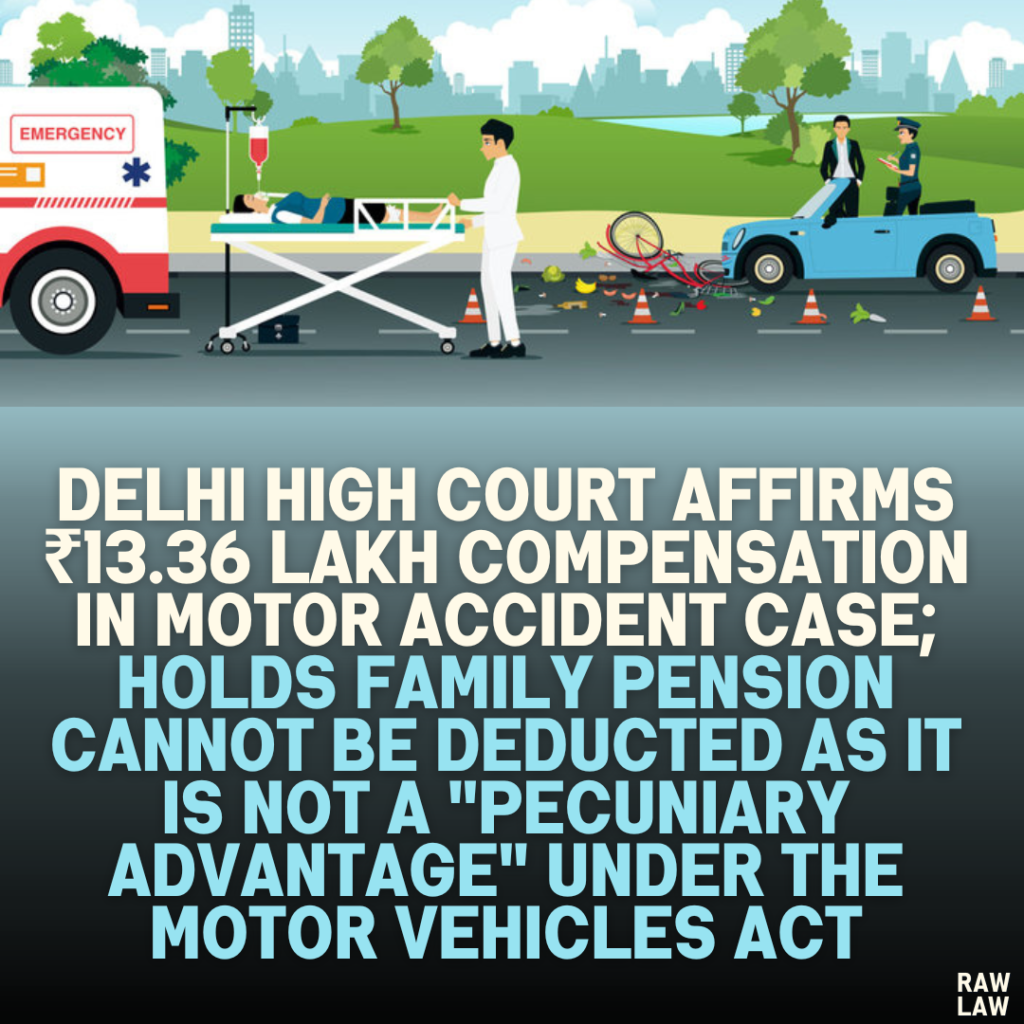Court’s Decision
The Delhi High Court dismissed the appeal filed by the insurance company, affirming the Motor Accident Claims Tribunal’s (MACT) award of ₹13,36,140 with 7% interest to the claimants—the wife and son of the deceased. The court held that family pension cannot be treated as a “pecuniary advantage” arising from the accident and thus, cannot be deducted from the compensation awarded under the Motor Vehicles Act.
Facts
- On November 21, 2021, the deceased, an 80-year-old retired Superintendent from a government school, was hit by a rashly driven vehicle while crossing the road near Madipur Police Chowki, Punjabi Bagh, Delhi.
- The accident caused grievous injuries, and the deceased succumbed to these injuries during treatment at a hospital.
- An FIR under Sections 279 and 304A of the Indian Penal Code (IPC) was registered against the driver.
- The deceased was receiving a pension of ₹41,737 per month, and after his demise, the wife received a family pension of ₹20,000 per month.
- The Tribunal awarded compensation to the claimants, calculating the loss of dependency without deducting the family pension. The insurance company challenged this in the High Court, arguing that family pension should be considered for deduction.
Issues
- Whether the family pension received by the deceased’s wife constitutes a “pecuniary advantage” that should be deducted from compensation for loss of dependency.
- What constitutes “pecuniary advantage” under the Motor Vehicles Act for the purpose of deduction from compensation?
Petitioner’s Arguments
The insurance company advanced the following contentions:
- The deceased was not gainfully employed and was receiving a pension, which continued as a family pension for his wife after his demise.
- Since the wife, the only dependent, was already receiving a substantial family pension, no compensation should have been awarded for the loss of dependency.
- The compensation awarded was excessive and required revision.
Respondent’s Arguments
The respondents (claimants) countered the appeal, arguing that:
- Family pension is a benefit earned by the deceased during their lifetime through service and is unrelated to the accidental death.
- Deducting family pension from compensation would undermine the intent of the Motor Vehicles Act, which seeks to provide fair compensation for financial loss caused by an accident.
- Precedents from the Supreme Court and High Courts have consistently held that family pension is not a pecuniary advantage linked to accidental death and cannot be deducted.
Analysis of the Law
The Motor Vehicles Act mandates just and fair compensation for financial loss resulting from an accident. The court analyzed several precedents to determine whether family pension can be deducted:
- Helen C. Rebello v. Maharashtra State Road Transport Corporation (1998):
- The Supreme Court ruled that only pecuniary advantages directly correlated to the accidental death are deductible from compensation.
- Benefits earned by the deceased during their lifetime, such as family pensions, are unrelated to the accident and cannot be deducted.
- Lal Dei v. Himachal Road Transport (2007):
- The court held that family pension is earned by the deceased as part of their service benefits and does not arise due to the accident. It is not a pecuniary advantage and hence not deductible.
- Vimal Kanwar v. Kishore Dan (2013):
- The court reiterated that benefits like family pension, provident funds, and insurance payouts are not pecuniary advantages within the meaning of the Motor Vehicles Act and are not deductible from compensation.
- Sebastiani Lakra v. National Insurance Company (2018):
- This judgment emphasized that pension, gratuity, or insurance payouts are contractual benefits earned during the deceased’s lifetime and are not connected to accidental death.
- Oriental Insurance Co. Ltd. v. Smt. Rathnamma (2023):
- The Karnataka High Court reaffirmed that family pension is a livelihood benefit and cannot be deducted from compensation as it is independent of the accident.
Precedent Analysis
The court found a consistent judicial trend in treating family pension as a separate benefit earned by the deceased during their lifetime. The precedents confirmed that:
- Family pension is a livelihood safeguard for dependents and cannot be equated with compensation for loss of dependency.
- Deducting family pension would effectively reward the tortfeasor (wrongdoer) and dilute the legislative intent of fair compensation under the Motor Vehicles Act.
Court’s Reasoning
The court observed:
- The purpose of compensation under the Motor Vehicles Act is to alleviate financial loss caused by an accident. It does not account for benefits unrelated to the accident, such as family pension.
- Family pension is a safeguard for dependents to maintain their livelihood and has no nexus with the accidental death.
- Allowing deductions for family pension would defeat the object of ensuring financial security to dependents after the loss of the deceased.
By applying the principles laid out in the cited judgments, the court concluded that the MACT rightly excluded the family pension from the calculation of compensation.
Conclusion
The Delhi High Court upheld the award of ₹13,36,140 along with interest, dismissing the appeal by the insurance company. The court directed the statutory deposit to be refunded to the insurance company as per the law.
Implications
The judgment reinforces the principle that family pension is independent of accidental death and cannot be deducted from compensation. This ensures fair restitution to dependents of accident victims while preventing tortfeasors from benefiting unjustly. It provides clarity on the non-deductibility of benefits earned by the deceased during their lifetime in motor accident claims.
